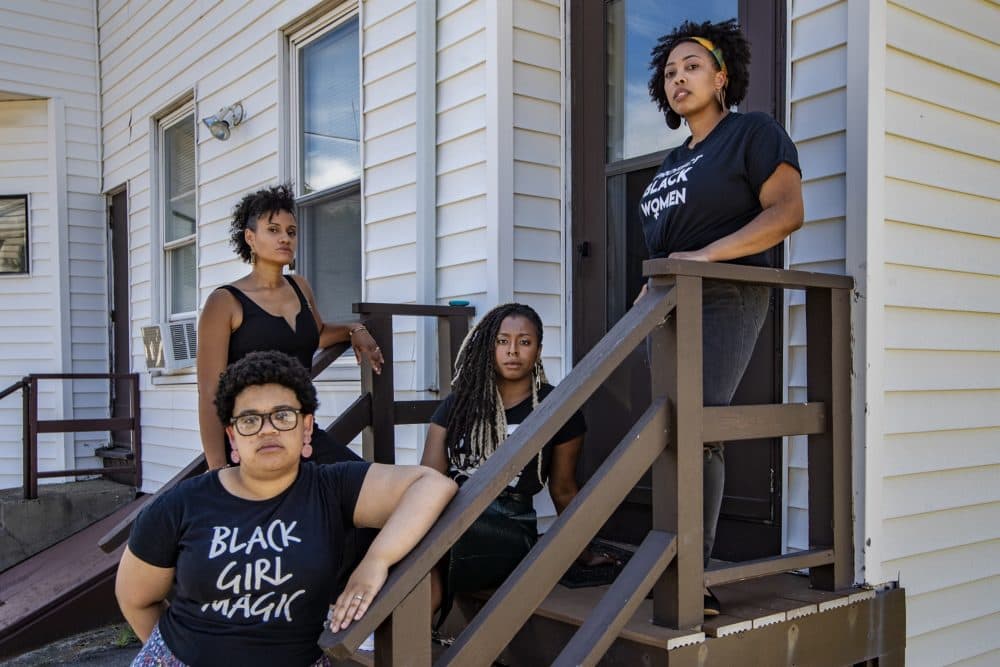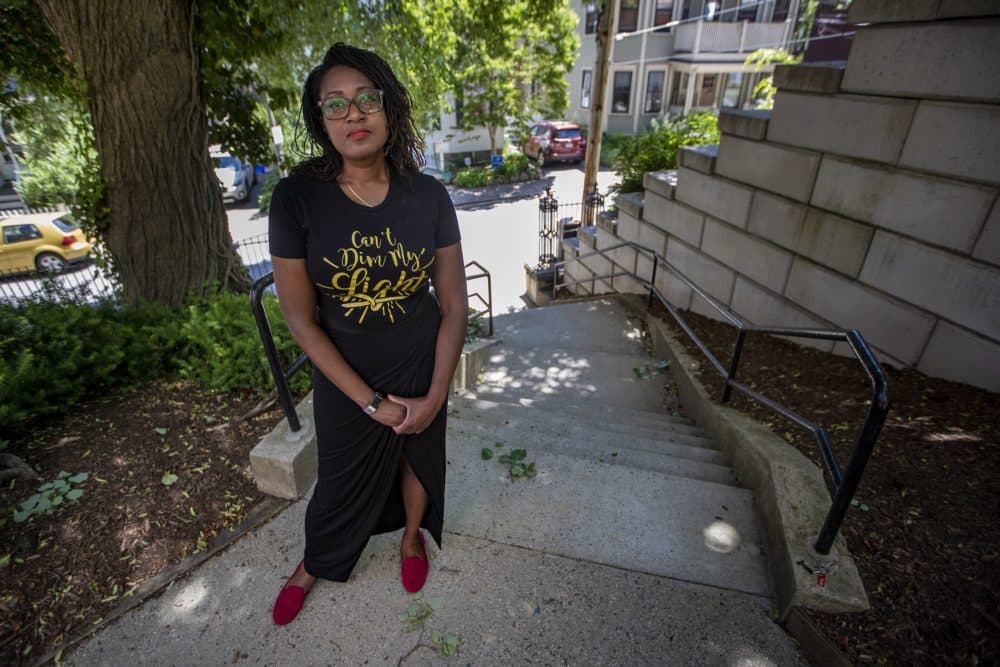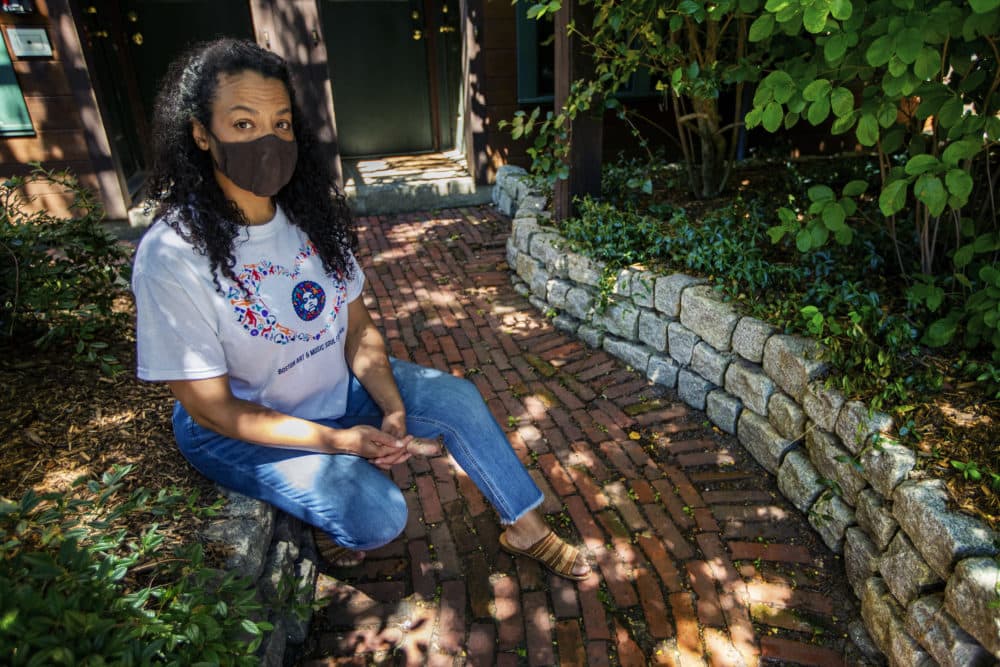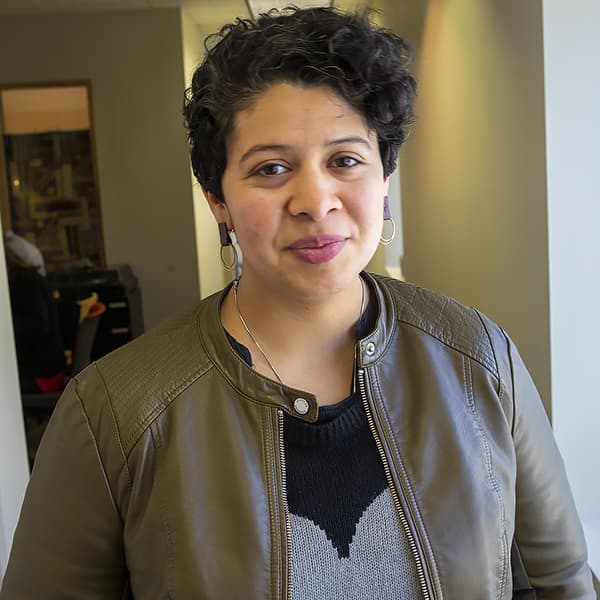Advertisement
'Now You Will See Us' — Being Black In Boston Theaters

At first, Lorraine Kanyike thought she misheard the man.
There’s no way he just said that, the young woman remembers thinking. Her mind raced. There’s no way this older patron whom she had just helped take a seat in a darkening American Repertory Theater had just called her that word.
“Do your job, [N-word],” she heard him utter.
She froze. The lights went out. The doors closed. The young usher took the man’s walker for safekeeping and left the theater as the play “Endlings” started.
Kanyike immediately told the house manager what happened. He was very supportive. And then, a year went by. The incident was never mentioned again.
“I think about that moment a lot. I wonder whatever happened to that patron. Are they allowed to still buy tickets and come see shows here?” said Kanyike, 22. “Because a lot of our front of house staff are people of color, specifically Black people. And I know that this is not the first time that something like that has happened.”
The A.R.T. said they identified, contacted and banned the patron from returning, but acknowledged they should’ve told Kanyike as well as the rest of their staff.
Over the years, these incidents of discrimination have happened again and again, often without being acknowledged at all, and causing artists and theater staff to question themselves. How can endemic white supremacy be combatted when it’s often within the very air they breathe?
Since the spring, the coronavirus pandemic has persisted in killing hundreds of thousands of people, inordinately affecting Black and brown lives, and resulting in a slew of canceled shows and millions in lost revenue. Theatermakers are scrambling to begin their seasons while reducing the possible transmission of this airborne disease.
Over the last several weeks in response to the killings of George Floyd, Breonna Taylor, Tony McDade and Ahmaud Arbery, two groups of employees inside two separate Boston theaters have sent their employers demands. In each case, the aim is to hold theaters accountable and ask them to do more than utter Black Lives Matter and place George Floyd’s name on their marquee and social media. They're asking for pay equity, changes to workplace culture, and an acknowledgment of how cultural organizations have been complicit in creating an environment that can make BIPOC (Black, indigenous, people of color) feel unwelcome at best and hinder their careers at worst. Nearly a dozen Black artists in Boston spoke to WBUR about how they’ve managed to navigate the rampant systemic racism that has existed for decades.
A Moment Of Reckoning
“I feel as though Black artists in Boston are really held at the consultant level all the time, and not really held to be in staff, creating changes and processes, becoming the thinkers that allow the actual change to trickle down,” said Tonasia Jones, interim program director at The Theater Offensive. Jones is also an actor and director. “There's some people who will not let that change come through. They're hiring to make change. But then once you try to make a change, they put up all these barriers so you can’t actually get it done.”
During a recent conversation, Jones and two other prominent queer Black actors she’s worked with and considers friends all shook their heads in dismay. They've lost count of the number of times a white person has confused them for one another. To be a Black actor in Boston means to prepare oneself bodily to walk into white spaces, to learn how to translate themselves to suit the needs of others. Jones refuses to do it.
“I do not enjoy code-switching,” Jones said. “It gives me so much anxiety and so many of the theaters in Boston, at least the ones I've worked, really require you to code-switch to be understood or else people will look at you like you're an alien.”
Actor Rachel Cognata remembers being part of a play that centered African culture, though not one person involved in the production staff outside of the cast was Black, let alone African. Specifically, no one who handled the music, dialects, or costumes was Black. Jones said she created a Google doc for the costume designers to know how to style her hair.
"I want to see change before I set foot in another audition, before I submit another tape for you. I want to actually see change."
Lyndsay Allyn Cox
During one production, actor Lyndsay Allyn Cox, remembers being told to act “Blacker.”
“I want to see change before I set foot in another audition, before I submit another tape for you,” said Allyn Cox, calling on theaters to hire people of color in leadership. “I want to actually see change. Go back to the drawing board. Revamp your season.”
Experiences like these have pushed all three to be vocal.
“Now we feel more empowered to be like, ‘No, actually, you don't have any Black people on the production team in a show that's about Black lives. Why is that?’ ” Cognata said. “It's a struggle when your paycheck depends on it, when maybe there's only one show that you might be eligible for within a whole season at a particular company ... I'm thinking more intentionally about how I choose what I choose to be a part of.”
To these actors, this is a moment of reckoning, a time where only action will suffice. And part of those measures need to address what ends up on stage, according David C. Howse, executive director at ArtsEmerson. That’s why four years ago they began the “Gaining Ground Fund" to elevate and encourage the ambitions of artists “developing work for the world stage that reflects the African Diasporic experience in America."
“We, as a country, are voracious consumers of Black suffering. That feels very comfortable for us,” Howse said. “We want to see Black people in oppressed states and that’s what sells in many ways. And one thing that we can do, and part of what the 'Gaining Ground' effort was to really tell the full story. Black excellence, Black brilliance, Black success stories. We are not a monolith. There are many kinds of experiences.”
He still remembers when he walked into his first meeting with other theater leaders in the region. As he describes, the walls were white. The chairs were white. Everything was white, including everyone else in the room. He found a seat and he recalls a colleague leaned over and politely said, “Oh, I’m sorry. This is the directors' meeting.” Howse looked at him for a moment and replied, “I know. It’s shocking, isn’t it?”
In some cases, Howse said, change also requires some sacrifice and challenging the status quo. One day a donor came in for a meeting with a hefty check and a request.
“She appreciated all what we were doing, but asked when we were going to do the excellent work and go back to putting ‘the world’ onstage, as if Africa and China and Chile were not the world,” Howse said. “Basically, ‘When are you going to go back to the Eurocentric projects?’ That was her way of saying, ‘My dollars to you are dependent on you doing what I say' ... So I said to her in that moment, ‘I can't accept your gift because we're not doing anything that makes you proud. Because for us, the world is much larger.' "
A Time For Reconciliation
Earlier this month, prominent Black Broadway performers released a letter titled, “We see you, White American Theater,” calling out entrenched racism. “We have watched you un-challenge your white privilege, inviting us to traffic in the very racism and patriarchy that festers in our bodies, while we protest against it on your stages. We see you. ... We have watched you exploit us, shame us, diminish us, and exclude us. We see you. We have always seen you. And now you will see us,” the letter reads.
“I think it's long overdue,” said Summer L. Williams, co-founder and associate artistic director of Company One Theatre. “I think people have been fighting these fights in silos. And now it's an opportunity for us to stand up and say no more, but beyond saying no more, we're going to say now here's what it's going to look like and here's what it has to look like.”

Part of that fight comes down to the writing. She wants to see more playwrights offer an intentional ethnic breakdown of their characters. Otherwise, there’s an automatic default to white. It also means hiring more people of color in positions of power.
Few local companies have artistic directors of color. The New Repertory Theatre in Watertown hired Michael J. Bobbitt last year. Two years prior, Christopher V. Edwards joined the Actors’ Shakespeare Project. Harold Steward is now producing co-executive director at The Theater Offensive.
At the Huntington Theatre Company in Boston, a group called the Huntington Coalition, composed of representatives from each department, told management that the layoffs and furloughs planned to roll out, “disproportionately affected the people of color in our organization.”
“Due to your staffing plan, we are frustrated, disappointed, and have lost trust in this organization,” the letter from the coalition read. “We also know that this is a time for change, and we hope you will address this letter with honesty and respect.”
"I think people have been fighting these fights in silos. And now it's an opportunity for us to stand up and say no more."
Summer L. Williams
Candelaria Silva-Collins, who works as the community membership coordinator at the Huntington, was among those furloughed in June. She said the coalition's letter has shaken the company and there have been many conversations since it was sent.
“I don't believe in diversity and inclusion anymore. I think those are really soft words because you can add one more person and that makes it that much more diverse than it was,” Silva-Collins said. “I'm really thinking about parity. I'm thinking about reparations. I'm thinking about reconciliation, which means you have to have truth telling where people have to acknowledge their part in this history that none of us selected but all of us are born into.”
Huntington executive director Michael Maso said they’re working to restructure this inequity.
“I think it's possible to be profoundly sincere and outraged about what's happening in the larger context while still being an imperfect institution,” Maso said. “The progress that we've made in building staff members of color over time has never reached the level that we felt was satisfactory to us over time and that's a work in progress and that's a work that we continue.”
He’s also grappling with his own outlook and said he’s committed to doing some personal work. Maso said the next books he plans to read is “White Fragility” by Robin DiAngelo and “How To Be An Antiracist” by Ibram X. Kendi. He signed up for a virtual workshop in July called “Anti-Racist Theatre” by facilitator Nicole Brewer.
“I have no particular level of expertise in understanding my own role and my own personal, whatever the personal version of institutional racism is,” Maso said. “The movement of the last two weeks, maybe I’m naive, but it does seem profoundly different. ... And I’ve taken the gaze of our staff members, who are so smart and passionate and committed to making our place a better place, and our colleagues across the country who say, ‘you may be my friend, but you have to do better.’ And I think we have to take it personally.”
At the American Repertory Theater in Cambridge, the A.R.T. People of Color Affinity Group presented a list of action items they feel the A.R.T. needs to begin addressing.
“In the A.R.T.’s most recent statement about Black Lives Matter, the theater made the claim that this organization is committed to dismantling white supremacy, however many Black and other employees of color have not experienced the safe haven that the A.R.T. is supposed to facilitate,” the affinity group wrote. “We have taken the time to sit down and articulate our thoughts, experiences, and subsequent ideas. However, it is important to stress that these ideas are not new. POC employees at the A.R.T. have been voicing these concerns since many of us were hired. We recognize that some actions have been taken but they are not enough.”
When asked for comment, A.R.T. artistic director Diane Paulus declined an interview but provided this statement: “To begin, executive producer Diane Borger and I have prioritized focusing inwards on our staff, intentionally listening and thinking critically about action steps to embed anti-racist practices throughout our institution, including our policies, structure, programming, philanthropy, communications, pedagogy, and workplace culture. Undertaking and resourcing this necessary work through a collaborative process with our staff will be our institution’s central focus now and moving forward.”
"This sort of systemic racism and the power structure that so many people have benefited from, it's almost coded in their DNA."
Dawn Simmons
Paulus was recently accused of racism by Griffin Matthews, a playwright and actor whose musical “Witness Uganda” premiered at A.R.T. in 2014. Matthews implicitly compared Paulus to Amy Cooper, the white woman who called the police on a Black man who was birdwatching in New York’s Central Park. Paulus also responded to Matthews with a statement at the time.
Last year, during the play “Pass Over,” Front Porch Arts Collective co-founder and artistic director Dawn Simmons found herself having to keep the audience in check.
The play, written by Antoinette Nwandu and directed by Monica White Ndounou, takes on the realities of police brutality. Due to the extreme nature of the content and the toll it took on actors, they chose to have a moment of healing at the very end. Only self-identified Black or brown people in the audience were asked to stay. However, some white patrons would not leave, even after being told this moment was not meant for them.
“This sort of systemic racism and the power structure that so many people have benefited from, it's almost coded in their DNA,” Simmons said. “... Every week, every day, we as BIPOC LGBTQIA individuals are trying to chip away at it. We're trying to shine a light on it. But it's so ingrained. So it's always surprising to me how surprised folks are when they are called out.”

One afternoon, during a talkback after the play, young students of color discussed the N-word and how they feel when they hear it said. There were rules set by the playwright that dictated use of this word. For example, it could only be said when quoting the text. Despite hearing the damage and anguish the word causes, several white members of the audience used the full word when they spoke. Each time, Simmons looked around and wondered if anyone else would have the courage to speak up against them.
Each time, that burden fell to her. "When you say that word, we stop hearing things," she told them. "When you say that word, all of this pain and trauma comes up. What we hear and what we feel is a person who doesn’t care or think enough about us to recognize this word hurts even if they don’t mean anything bad by it."
“The [expletive] those human beings had to go through to do this, the trauma they put on that stage that we witnessed with them every night, making people sick,” Simmons said. “And people are like, ‘I totally get it, I totally get it.’ And then this moment happens and it's a microcosm, right? It's just this perfect storm. And I'm like, ‘You don't get it. No, you didn't get it.’”
Pascale Florestal, dramaturg and director, was there that night. She remembers those moments, what Simmons had to do to educate people and how that labor always falls on a person of color. She hopes that one day it won’t. She hopes one day it’ll stop.
“How are we going to create theater [that is] sustainable? Because it's not sustainable right now,” Florestal said. “We have to be innovative. So that means we have to lean on the people who have had to be innovative because they were left out of the conversation. That's artists of color. That's queer artists. That's artists who have disabilities. It's time for us to put them at the forefront and give them opportunities for their stories to be told.”
